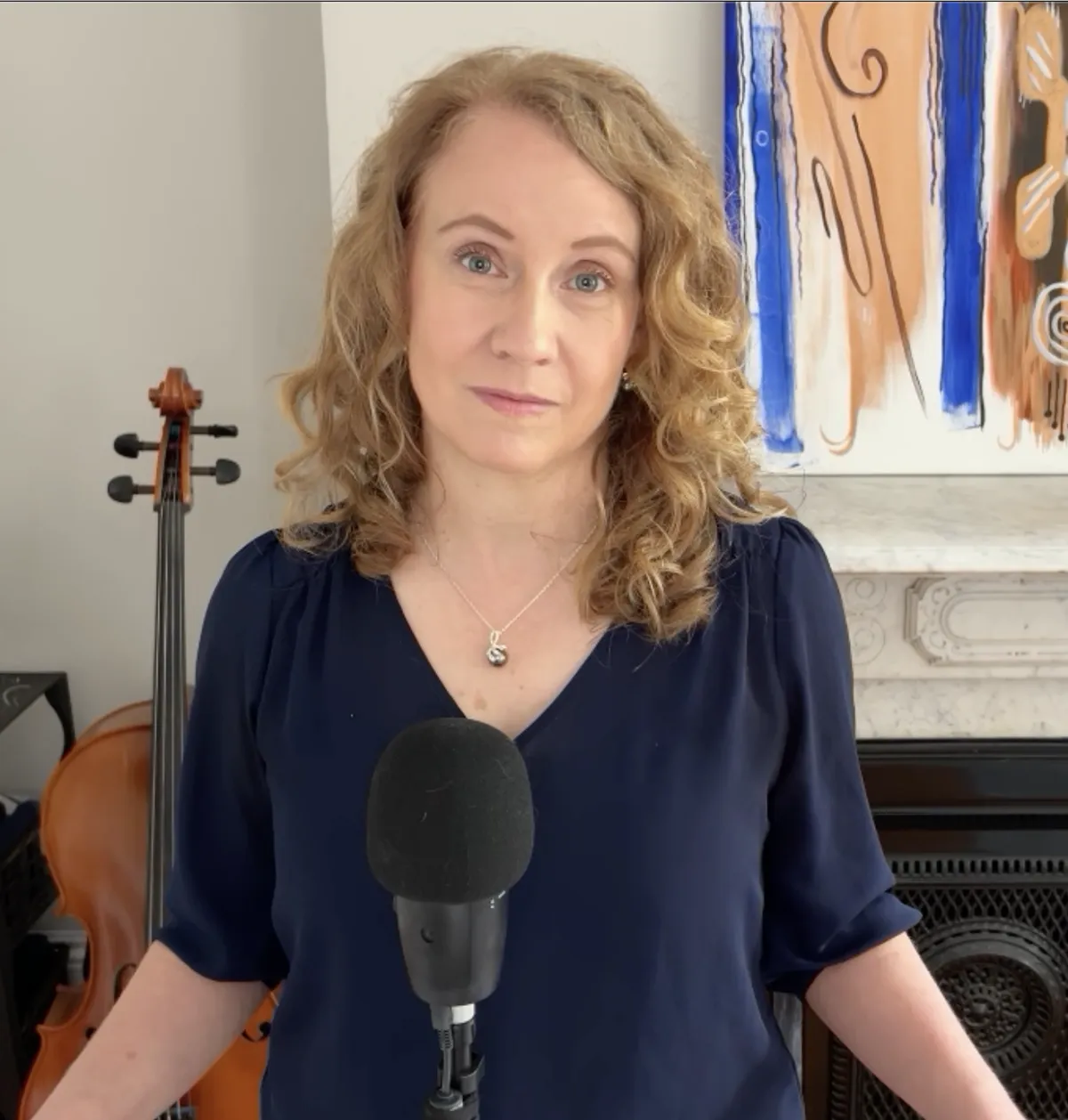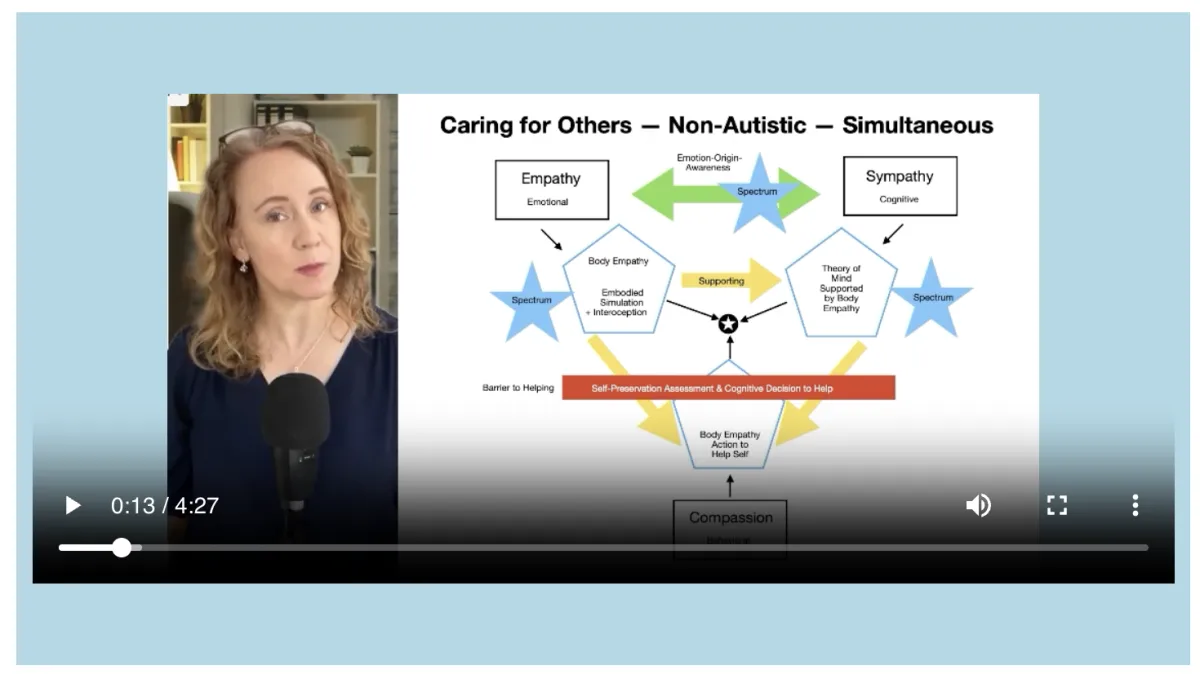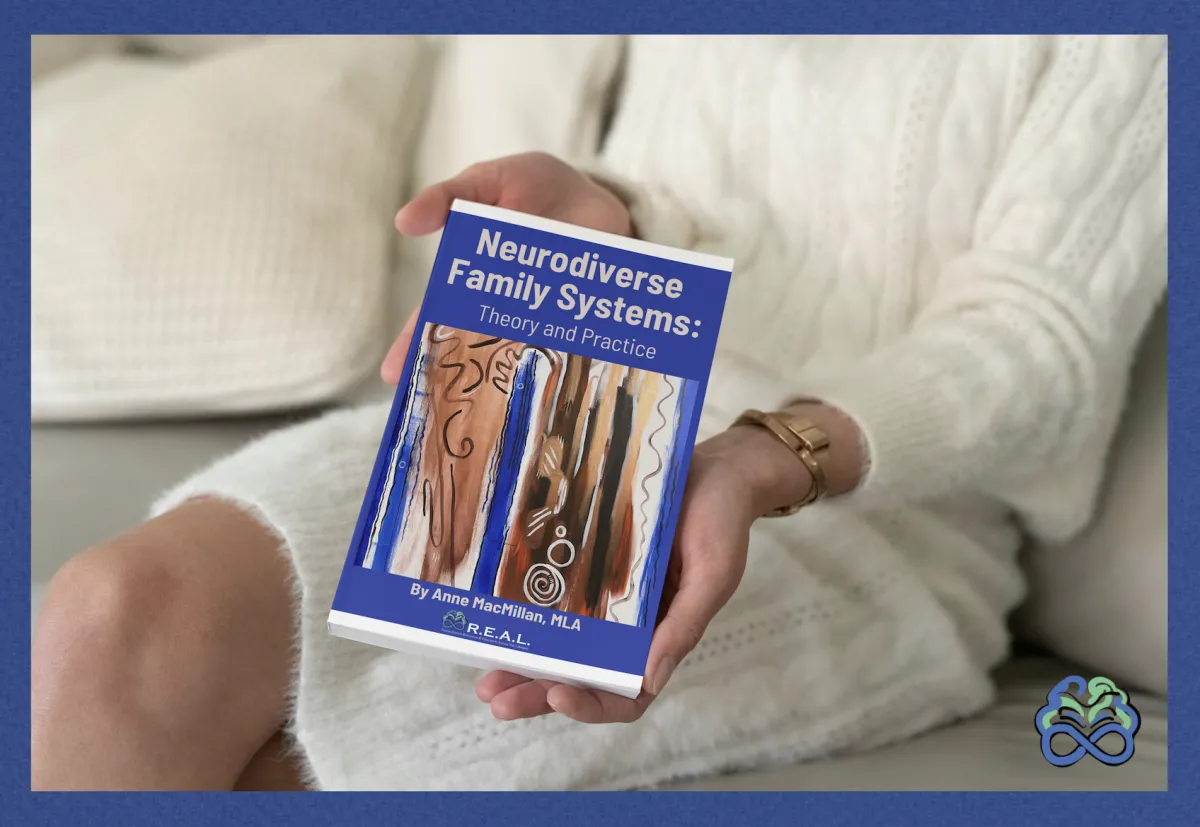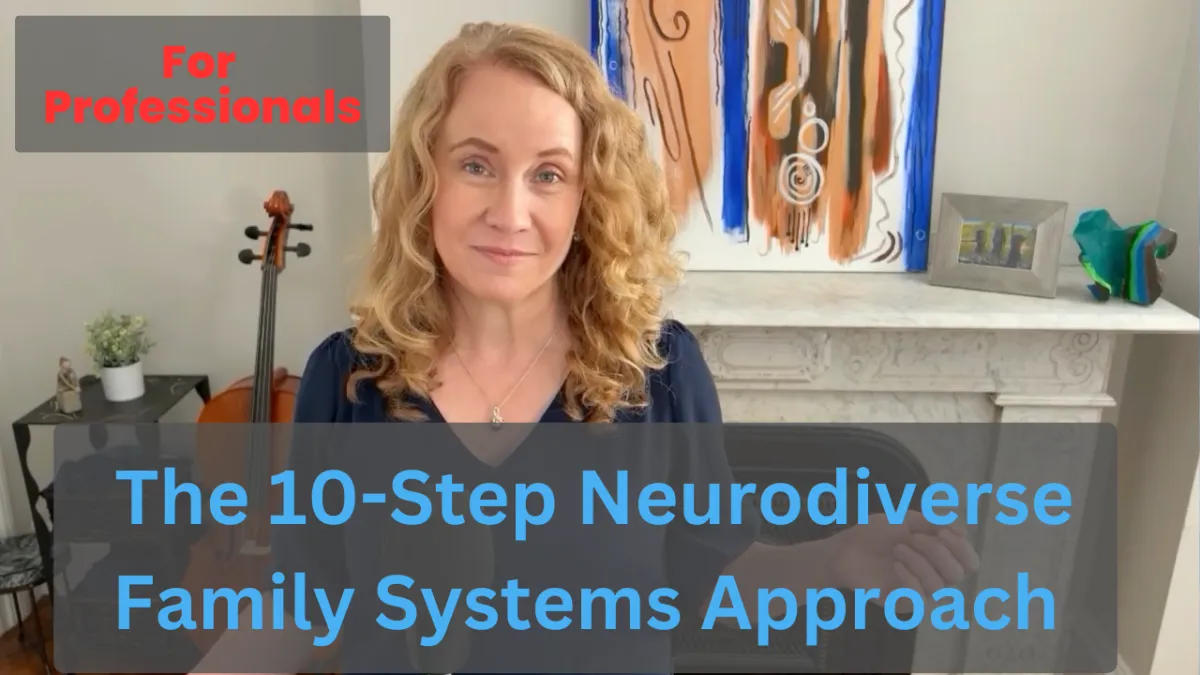
MacMillan's 10-Step Neurodiverse Family Systems Approach:
A Comprehensive Framework
to support neurodivergents and their families throughout adulthood.
R.E.A.L. Neurodiverse Programs For Professionals
WHAT ARE THE R.E.A.L. PROGRAMS?
Autism and other forms of neurodivergence shape how adults engage in social relationships—especially in families and intimate partnerships, where emotional demands run high and communication styles often differ.
Developed by Anne MacMillan, MLA, the R.E.A.L. Neurodiverse programs offer a clear, research-informed path forward. Built around a structured 10-step approach, these programs translate neuroscience, developmental psychology, and clinical insight into practical tools for real-life change. Adults gain access to targeted education, specialized assessments, and concrete strategies for building skills, making decisions, and strengthening relationships.
As awareness of adult neurodivergence expands, so does the demand for services that meet the moment—with depth, precision, and respect for every individual’s way of being.
WHY SHOULD YOUR PRACTICE USE THE R.E.A.L. PROGRAMS?
Neurodiverse families are commonly made up of autistic, attention neurodivergent (ADHD), and other neurodivergent family members. The different brains' different ways of perceiving and navigating the social world affect family social interactions, eliciting difficulties and distress that commonly lead to trauma and isolation.
In the mid-20th century, before neurodivergence in aNeurodiverse families often include autistic, attention neurodivergent (ADHD), and other neurodivergent members. Differences in how each brain processes social and emotional information shape everyday interactions—frequently leading to misunderstanding, relational strain, and social isolation.
In the mid-20th century, long before adult neurodivergence was recognized, psychology framed mental and relational challenges as evidence of disorder. Many neurodivergent individuals—unaware of their neurological differences—were mischaracterized as broken or dysfunctional. These labels disempowered them, and treatments that failed to account for brain-based variation often offered little meaningful support.
In the early 21st century, autism’s prevalence in children came into focus. Only now are we beginning to recognize the widespread presence of neurodivergence in adults. These adults are not disordered. They do not need to be “fixed.” They need access to insight, language, and tools that respect their neurology—so they can build skills, reduce suffering, and strengthen their relationships.
The R.E.A.L. Neurodiverse programs offer that path forward.dults was understood or recognized, psychologists began defining mental disorders that required treatment. Many neurodivergents, completely unaware that their brains were different, were unjustly labeled as "disordered" or "broken." These labels disempowered neurodivergents and treatments that didn't recognize brain differences offered little relevant support.
The high prevalence of autism in children was discovered in the early years of the 21st century. Today, we are finally recognizing multiple neurodivergencies in adulthood. These adults aren't "broken." They don't need "treatment" for "disorders." They need to understand the nuances of brain differences and have access to resources that will help them leverage their strengths and build skills to address their challenges.
The R.E.A.L. Neurodiverse programs offer solutions: solutions that work.

R.E.A.L. Neurodiverse
Resources & Education Across the Lifespan

Anne MacMillan, MLA
Author of the 10-Step Neurodiverse Family Systems Approach, Speaker, Researcher, Consultant, Coach, Educator and Expert Witness
WHO ARE THE R.E.A.L. PROGRAMS FOR?
Our comprehensive 10-step method is designed for use by psychologists, therapists, social workers, counselors, teachers, coaches, consultants, clergy, domestic violence workers, victim advocates and more.
The R.E.A.L. Neurodiverse Family Systems Approach is a comprehensive 10-step method for coaches, consultants, teachers, therapists, psychologists, social workers, mediators, domestic violence workers, victim advocates, spiritual leaders, and more.
The approach is designed to support professional growth through both structured education and direct relational experience. To access the full programs, at least one provider per office must complete our NFS-E Credential and become a Neurodiverse Family Systems – Educator. This ensures that each office has a designated provider who understands the framework and can guide implementation with fidelity.
While only one team member is required to complete the full credentialing process, all other providers receive meaningful and accessible support to ensure high-quality care across the team. Every provider begins with a clear, neurologically informed orientation that introduces the program’s foundational concepts, implementation principles, and ethical guidelines. From there, learning continues through guided use of the program materials with clients. As clients move through the 10-step structure, providers gain access to corresponding provider resources—learning in real time how to support neurologically diverse adults with clarity and care.
This approach reflects a core truth of neurodiverse relational systems work: while structured training is essential, deep understanding develops through direct experience. The program honors this by allowing providers to grow alongside their clients. Even those who are new to neurodiverse systems will find that the materials are intuitive, grounded, and developmentally attuned—inviting providers to apply their own wisdom while building confidence in a new and important domain.
WHAT MAKES R.E.A.L. DIFFERENT?
Traditional interventions are grounded in the assumption that relationship conflict can be resolved through shared dialogue and emotional processing. But in neurodiverse families and intimate life partnerships, these methods often overlook the root cause of distress: neurological mismatch.
The R.E.A.L. Neurodiverse model introduces a fundamental paradigm shift. Instead of beginning with group sessions, we start with the individual—recognizing that perception, empathy, expression, and regulation differ profoundly across neurotypes. Our structured 10-step program replaces generalized talk therapy with neurotype-specific education, tools, and developmental supports.
This shift moves providers away from pathologizing behavior and toward honoring difference. It reframes family and intimate partnership conflict not as dysfunction, but as the result of unmet neurological needs—and offers a clear, compassionate pathway for lasting change, even when only one partner or family member is ready to begin.



HOW DO THE R.E.A.L. PROGRAMS WORK?
The R.E.A.L. Neurodiverse Family Systems Approach guides adults—and the professionals who support them—through a structured but flexible 10-step process designed to build insight, reduce distress, and support sustainable relational growth. Clients receive materials tailored to their neurology (autistic or non-autistic), while providers use parallel resources that align with the client’s processing style.
Each of the 10 steps addresses a core dimension of neurodiverse relational life—such as empathy differences, neurological mismatch, relational role entrenchment, boundary development, problem solving, and cycles of trauma. Steps are sequential but adaptable, allowing providers to meet clients where they are without sacrificing developmental integrity.
Clients move through video-based educational content, guided assessments, structured reflection prompts, and integrative exercises that help them make sense of their experiences through a neurologically attuned lens. Providers receive step-specific guides that support interpretation, discussion, and skill-building, ensuring that support remains aligned with the client’s neurotype and developmental readiness.
Unlike many traditional models that prioritize behavior change or surface-level communication strategies, the R.E.A.L. Approach integrates neurological, emotional, somatic, and systemic layers of experience.
Tools range from conceptual mappings and guided journaling to artwork-based exercises and somatic strategies—supporting a wide range of processing styles and learning needs.
Because each client engages individually, the program remains effective whether or not other family members or partners are involved. When multiple participants are ready, shared theory and neurologically specific tools create a common language for growth without forcing consensus or conformity.
About Anne MacMillan:
I am the creator of the R.E.A.L. Neurodiverse™ Family Systems Approach — the first comprehensive, educational 10-step model designed to help autistics, non-autistics, and professionals understand the neurological foundations of relational conflict and connection. My work integrates developmental psychology, systems theory, and over five decades of lived experience inside profoundly neurodiverse family systems.
I originally developed the Neurodiverse Family Systems Theory based on my education, personal history, and the insights I gained in the private neurodiverse services practice I founded in 2017. Since then, the work has evolved into a clear, scalable framework that professionals can use to guide their clients through complex neurodiverse dynamics with structure, clarity, and compassion.
Today, I support professionals across disciplines — therapists, psychologists, coaches, social workers, clergy, and educators — who are discovering that neurodiversity is often the missing piece in the adult relationship challenges they see. Through the Neurodiverse Family Systems Educator Credential (NFS‑E), providers gain access to the full R.E.A.L. 10-Step system, including original quantitative assessments, dyadic tools, and evidence-informed support resources they can immediately apply with clients.
I hold a research-based master’s degree in psychology from Harvard University, where I received the Director’s Thesis Award for one of the world’s first quantitative studies on Level 1 autism in intimate life partnerships. My graduate and undergraduate studies focused on developmental psychology — work that continues to inform every aspect of the R.E.A.L. approach.
In total, I bring more than 50 years of lived experience in neurodiverse family systems (including my childhood in a profoundly neurodiverse family), over 20 years of experience in a neurodiverse intimate partnership, and nearly a decade of professional practice supporting individuals, couples, and families navigating the complexities of neurodiversity.
I self-identify as a high body empathetic and attention neurodivergent (ADHD). I’ve never pursued a formal ADHD diagnosis, as I trust self-identification over professional labeling. I am not autistic, but I have spent my life deeply connected to autism, attention-based neurodivergence, and high-body-empathy neurology — both personally and professionally. My work is dedicated to helping others gain the clarity, skills, and relational wellbeing they deserve.

Anne MacMillan, MLA
Author of the R.E.A.L. 10-Step Neurodiverse Family Systems Approach, Speaker, Researcher, Consultant, Coach, Educator and Expert Witness

Recent Blog Posts

Understanding Neurodiversity: A New Frontier in Psychology
Understanding Neurodiversity: A New Frontier in Psychology
In recent years, our understanding of autism and neurodiversity has advanced significantly, shedding light on the complexities and prevalence of Level 1 autistic adults within our families and communities. Many Level 1 autistics are parents, raising children who are also on the autism spectrum due to autism's genetic component. Furthermore, the co-aggregation of autism with attention neurodivergence (ADHD) within the same families has been established (Ghirardi et al., 2017; Suk-Ling Ma et al., 2021). I add that neurodiverse families also have a third common neurodivergence that I term 'high body empathy neurodivergence,' contributing to the neurological variations within neurodiverse families.
And I calls for a paradigm shift: I suggest we view families as systems and focus on how neurological differences affect interaction patterns rather than on "fixing" or changing individuals or blaming problems on any one neurology.
The Need for Specialized Support
If you are a psychologist, therapist, social worker, clergy member, coach, or domestic violence professional who works with adults, you may have noticed that the increasing societal awareness of Level 1 autism has meant that a growing number of your adult clients are either Level 1 autistics themselves, or have Level 1 autistic adult family members or intimate life partners. Or, at the very least, you may have noticed that more and more of your adult clients' children have Level 1 autism diagnoses, indicating the possibility that at least one of their parents may also be on the autism spectrum. You may have come to recognize that providing meaningful service to this population requires a deep understanding of neurodiverse family dynamics, a gap that current mainstream psychology generally fails to bridge.
I’m Anne MacMillan, founder of R.E.A.L. Neurodiverse, and my journey in understanding neurodiverse family systems and Neurodiverse Relationship Dynamics (NRD) is founded in personal experience. I was born into a neurodiverse family during a time when Level 1 autism was not well understood. I then married a Level 1 autistic man, knowing nothing about autism, but finding comfort in the familiarity of the neurodiverse interaction patterns I recognized from my childhood. I am not autistic myself, but story is shared by many non-autistics who are members of neurodiverse families, demonstrating a multigenerational span of neurodiversity that is more common than often acknowledged.
Bridging the Gap: R.E.A.L. Neurodiverse Family Systems
After years of personal confusion and professional exploration, I developed the R.E.A.L. Neurodiverse Family Systems approach. This practical 10-step method provides practitioners with the tools and understanding needed to effectively support individuals from neurodiverse families. My academic background, including a master's in psychology from Harvard University and pioneering research on autism and intimate adult relationships, informs my comprehensive approach.
The R.E.A.L. Neurodiverse programs expand on Damien Milton's double empathy problem (Milton, 2012, 2017) through defining Neurodiverse Relationship Dynamics (NRD), empathy differences, roles and cycles common in neurodiverse family systems, and by providing differing models of psychosocial development for autistics and non-autistics based in Erik Erikson's seminal work (1950, 1959, 1982). My 10-step system begins with accepting the wholeness of individuals with all neurological variations then offering clients education so they can more easily comprehend what specifically makes their own brains different from their family members' brains. Once individuals are less confused about neurodiversity and NRD, practitioners support them as they seek to make family-affirming life decisions that will bring them the happiness and peace everyone deserves.
Empowering Professionals with Knowledge and Tools
Since launching my private practice in 2017, I have translated my extensive experience into programs that empower professionals to support neurodiverse families across the globe. These programs begin with a credentialing course comprising 20 sections, preparing practitioners to understand the challenges their clients face.
Practitioners gain access to over 200 informative and engaging credentialing videos, equipping them with the information they need to more fully comprehend neurodiverse family systems before they attempt to engage with clients. Upon completing the credentialing, professionals gain access to the programming they need to guide their clients through my R.E.A.L. Neurodiverse 10-step approach.
The UnitusTI Therapy and Education platform supports the administration of these programs, offering features like session notes, billing service codes, comprehensive client files, and narrative and data-driven clinical reports, helping professionals run the business side of their neurodiverse family systems practice as smoothly as the support side.
Alongside the educational videos for clients, practitioners can utilize over 15 quantitative scales to build client self-awareness, measure progress, and support decision making. The program also walks practitioners through supporting clients in understanding four cycles and 15 roles common within neurodiverse family systems, helping clients understand the roles' functions in their individuals lives and the systemic functions in their neurodiverse family systems. MacMillan addresses several types of trauma common in neurodiverse family systems and the reality that Neurodiverse Relationship Dynamics (NRD) elicit intermittent trauma spikes. Practitioners are offered information regarding how to use MacMillan's complementary models of psychosocial development for autistics and non-autistics so their clients can better comprehend how to forward their own psychosocial development as well as what is different about their psychosocial development and the psychosocial development of their family members.
A Call to Action: Transforming Support for Neurodiverse Families
The burgeoning field of neurodiversity represents the cutting edge of psychology. Neurodivergent individuals and their families are eager for solutions that extend beyond diagnoses, solutions that recognize the social dimensions of autism in relationships and parenting. To meet this need, R.E.A.L. Neurodiverse offers specialized programs for couples, families, and parents navigating these challenges, aiming to facilitate personal growth, self-awareness, and practical answers to complex questions.
My hope is to engage with professionals who bring their expertise and feedback to refine and advance this model. Together, we can build theoretically and evidence-based solutions that truly support neurodiverse families, offering the understanding and services they need and deserve.
For a demonstration or to learn more about how our programs can enhance your practice, please reach out to me or my UnitusTI support team for a demo. Learn more at REALneurodiverse.com.
I’m Anne MacMillan from R.E.A.L. Neurodiverse, and I invite you to join me at the forefront of psychology as we work together to better support all individuals from neurodiverse families.
Support for Professionals and Clients:
Neurodiverse Credentialing and Practice Support for Psychologists, Therapists, Social Workers, Clergy, and Domestic Violence workers is available here.
Autistic and non-autistic members of neurodiverse family systems can reach out for support here.
Resources for Further Exploration:
Read Ghirardi et al.'s 2017 study "The Familial Co-Aggregation of ASD and ADHD: A Register-Based Cohort Study" in the Journal of Molecular Psychiatry, Feb. 2018, 23(2), pp. 257-262, doi:10.1038/mp.2017.17.
Read Suk-Ling Ma et al.'s 2021 research "Genetic Overlap Between Attention Defecit/Hyperactivity Disorder and Autism Spectrum Disorder in SHANK2 Gene" published in Frontiers in Neuroscience, Vol. 15, doi:10.3389/fnins.2021.649588.
Learn more about the SHANK2 gene.
Read Damian Milton's 2012 article "On the Ontological Status of Autism: The 'Double Empathy Problem'" published by Disability and Society, 27(6), pp. 883-887, doi:10.1080/09687599.2012.710008.
Read Milton's 2017 book, A Mismatch of Salience, about communication difficulties between autistics and non-autistics published by Pavilion Publishing and Media Ltd.
Read one of Erik Erikson's own books: Childhood and Society (1950), Identity and the Life Cycle (1959), or The Life Cycle Completed (1982) republished by W.W. Norton & Company in 1993, 1994 and 1998.

Anne MacMillan, MLA
Author of the R.E.A.L. 10-Step Neurodiverse Family Systems Approach Available on the UnitusTI Cloud
About the Book
Neurodiverse Family Systems: Theory and Practice offers a groundbreaking framework for understanding the unique relational dynamics that emerge within families shaped by neurological difference. Bridging developmental theory, lived neurodivergent experience, and applied clinical insight, this book challenges conventional models and introduces a nuanced approach to working with autism, ADHD, and high body empathy across generations.
Essential reading for professionals seeking to deepen their understanding of neurodiverse relational systems, it invites a rethinking of how empathy, trauma, and identity operate within the family landscape—and how meaningful change begins with neurological clarity. connection, stability, and emotional peace.

© 2025 R.E.A.L. Neurodiverse™
All Rights Reserved
anne@REALneurodiverse.com
Text or Call: (617) 996-7239 (United States)
